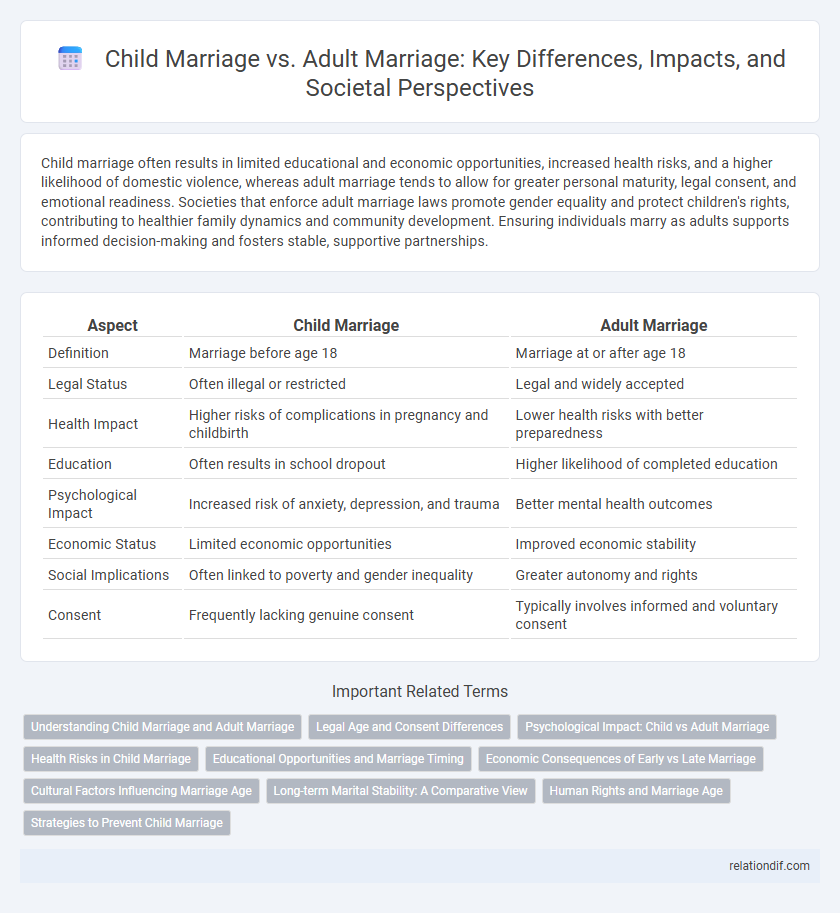Child marriage often results in limited educational and economic opportunities, increased health risks, and a higher likelihood of domestic violence, whereas adult marriage tends to allow for greater personal maturity, legal consent, and emotional readiness. Societies that enforce adult marriage laws promote gender equality and protect children's rights, contributing to healthier family dynamics and community development. Ensuring individuals marry as adults supports informed decision-making and fosters stable, supportive partnerships.
Table of Comparison
| Aspect | Child Marriage | Adult Marriage |
|---|---|---|
| Definition | Marriage before age 18 | Marriage at or after age 18 |
| Legal Status | Often illegal or restricted | Legal and widely accepted |
| Health Impact | Higher risks of complications in pregnancy and childbirth | Lower health risks with better preparedness |
| Education | Often results in school dropout | Higher likelihood of completed education |
| Psychological Impact | Increased risk of anxiety, depression, and trauma | Better mental health outcomes |
| Economic Status | Limited economic opportunities | Improved economic stability |
| Social Implications | Often linked to poverty and gender inequality | Greater autonomy and rights |
| Consent | Frequently lacking genuine consent | Typically involves informed and voluntary consent |
Understanding Child Marriage and Adult Marriage
Child marriage is defined as a formal marriage or informal union before the age of 18, often resulting in limited educational and economic opportunities for the minor involved. Adult marriage typically involves individuals aged 18 or older, characterized by greater legal rights, consent, and the ability to make informed decisions about family planning and personal development. Understanding these distinctions is crucial for addressing the social, legal, and health implications associated with early marriage practices.
Legal Age and Consent Differences
Child marriage, often defined as a union where one or both parties are below the legal age of 18, lacks the informed consent essential for a valid and equitable marriage. Legal age requirements for adult marriage typically mandate individuals to be 18 years or older, ensuring that both parties have the cognitive maturity and legal capacity to consent freely. Differences in consent laws highlight that adult marriages require explicit, voluntary agreement, whereas child marriages frequently involve coercion or social pressure, undermining individual rights and protections.
Psychological Impact: Child vs Adult Marriage
Child marriage often results in severe psychological effects, including depression, anxiety, and post-traumatic stress disorder, due to the abrupt loss of childhood and forced assumption of adult roles. Adult marriage, typically entered with greater maturity and consent, tends to foster better emotional stability, healthier relationship dynamics, and enhanced capacity for conflict resolution. Long-term studies reveal that individuals married as children face significantly higher rates of mental health disorders, reduced self-esteem, and impaired social development compared to those married as adults.
Health Risks in Child Marriage
Child marriage significantly increases health risks, including higher rates of maternal mortality and complications during childbirth due to underdeveloped bodies. Girls married before 18 are more vulnerable to sexually transmitted infections and mental health issues, stemming from early pregnancy and social isolation. Preventing child marriage improves health outcomes by ensuring access to education, healthcare, and delayed pregnancy.
Educational Opportunities and Marriage Timing
Child marriage often restricts educational opportunities, limiting personal growth and future economic prospects, whereas adult marriage typically allows individuals to complete their education, fostering better life planning and stability. Early marriage frequently interrupts schooling, leading to lower literacy rates and reduced empowerment, while marrying as an adult correlates with higher educational attainment and improved socio-economic outcomes. Delaying marriage until adulthood enhances access to education and promotes informed decisions, contributing to healthier family dynamics and community development.
Economic Consequences of Early vs Late Marriage
Early marriage often results in limited educational and employment opportunities, leading to lower lifetime earnings and increased poverty risk. In contrast, adult marriage typically allows for greater economic stability due to higher educational attainment and career development before family responsibilities. Child marriage perpetuates economic dependency and restricts financial independence, while late marriage supports improved household income and economic growth.
Cultural Factors Influencing Marriage Age
Cultural factors such as traditional beliefs, community norms, and religious practices significantly influence the age at which individuals marry, often encouraging child marriage in certain regions. In many societies, early marriage is perceived as a means to secure family honor, economic stability, or social alliances, perpetuating the cycle of child marriage despite legal restrictions. Conversely, cultures emphasizing education and individual autonomy tend to promote adult marriage, aligning with global trends toward delaying marriage age for better socioeconomic outcomes.
Long-term Marital Stability: A Comparative View
Child marriage significantly increases the risk of long-term marital instability due to factors such as emotional immaturity, limited education, and socioeconomic disadvantages. Adult marriages benefit from greater emotional readiness, legal protections, and often higher educational attainment, contributing to more stable and resilient partnerships. Studies consistently show that adult marriages have lower divorce rates and better long-term relational outcomes compared to child marriages.
Human Rights and Marriage Age
Child marriage violates fundamental human rights by denying minors the freedom to choose their partners and undermining their health, education, and personal development. International human rights frameworks, including the Convention on the Rights of the Child, advocate for a minimum marriage age of 18 to protect young individuals from exploitation and harmful consequences. Adult marriage, defined legally as unions between consenting persons aged 18 and above, ensures the respect of autonomy, informed consent, and the right to equitable partnerships.
Strategies to Prevent Child Marriage
Promoting comprehensive sexuality education and enforcing strict legal age requirements are crucial strategies to prevent child marriage. Community engagement programs that involve local leaders and parents raise awareness about the risks and consequences of early marriage. Providing economic incentives and educational opportunities for girls significantly reduces the likelihood of child marriage by empowering them to pursue adulthood on their own terms.
Child Marriage vs Adult Marriage Infographic

 relationdif.com
relationdif.com